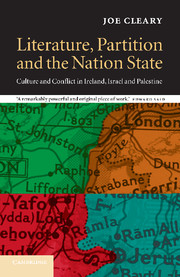Book contents
- Frontmatter
- Contents
- Acknowledgements
- Introduction
- Part I
- Part II
- 3 ‘Fork-tongued on the border bit’: partition and the politics of form in contemporary narratives of the Northern Irish conflict
- 4 Agonies of the potentates: journeys to the frontier in the novels of Amos Oz
- 5 The meaning of disaster: the novel and the stateless nation in Ghassan Kanafani's Men in the Sun
- Notes
- Index
5 - The meaning of disaster: the novel and the stateless nation in Ghassan Kanafani's Men in the Sun
Published online by Cambridge University Press: 22 September 2009
- Frontmatter
- Contents
- Acknowledgements
- Introduction
- Part I
- Part II
- 3 ‘Fork-tongued on the border bit’: partition and the politics of form in contemporary narratives of the Northern Irish conflict
- 4 Agonies of the potentates: journeys to the frontier in the novels of Amos Oz
- 5 The meaning of disaster: the novel and the stateless nation in Ghassan Kanafani's Men in the Sun
- Notes
- Index
Summary
‘Mold your sword into a ploughshare.’
‘You've left no land.’
Samih al-QasimThe 1948 disaster led to the destruction of Palestinian society and to the dispersal of the Palestinian people across the Middle East and beyond. Today there are almost a million Palestinians within Israel while close to three million others live in the West Bank and Gaza. It is estimated that approximately another four million live in the Diaspora, most as proximate exiles in Jordan, Syria and Lebanon, just across the border from what was once their home. In some of the Arab states the conditions of the displaced Palestinians are much better than others, but, as the fate meted out to them in Kuwait after the Gulf War attested, the treatment accorded to the Palestinians can alter rapidly according to circumstances. Whether they live in refugee camps in Lebanon, as prosperous citizens in Jordan, as guest workers in Kuwait, in the squalor of Gaza, or as second-class citizens in Israel, the relationship between Palestinians and the established state order in the Middle East continues to be deeply vexed.
The crux of the problem for Palestinians, however, is that the oppressive conditions that generate a distinctive sense of Palestinian national consciousness among these scattered communities are not necessarily those that allow for the translation of that consciousness into a collective project of state formation. Where a subject people live in a contiguous national territory controlled by a foreign occupier, national consciousness can be directed towards expelling the occupier and building an independent state on that territory.
- Type
- Chapter
- Information
- Literature, Partition and the Nation-StateCulture and Conflict in Ireland, Israel and Palestine, pp. 186 - 225Publisher: Cambridge University PressPrint publication year: 2001



